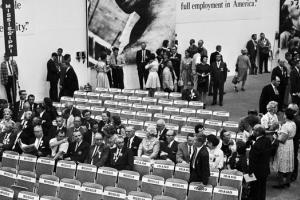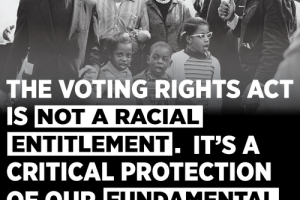The Freedom Summer of 1964 Launched a Voting Rights Revolution
Teen Vogue
 Reader Comments - "I Question America" -- Remembering Fannie Lou Hamer; The Coming Race War Won't Be About Race; Ferguson - Politicians and AFL-CIO - Both Missing; Israelis in US: An Open Letter to American Jews on Gaza; Minnesota Home Health Care Workers Unionize; Ukraine and Neo-Nazis; Sanctions & the Dollar;
Economic Democracy Project's first event: Economic Democracy And The Struggle For Black Independence - Sept. 3 - New York
Reader Comments - "I Question America" -- Remembering Fannie Lou Hamer; The Coming Race War Won't Be About Race; Ferguson - Politicians and AFL-CIO - Both Missing; Israelis in US: An Open Letter to American Jews on Gaza; Minnesota Home Health Care Workers Unionize; Ukraine and Neo-Nazis; Sanctions & the Dollar;
Economic Democracy Project's first event: Economic Democracy And The Struggle For Black Independence - Sept. 3 - New York
 Young volunteers spent the summer of 1964 in Mississippi, working to register African-American voters. But leaders of the movement also had a political strategy designed to chip away at the oppressive white power structure in the South, and it was put to the test at the Democratic National Convention in Atlantic City, N.J.
Young volunteers spent the summer of 1964 in Mississippi, working to register African-American voters. But leaders of the movement also had a political strategy designed to chip away at the oppressive white power structure in the South, and it was put to the test at the Democratic National Convention in Atlantic City, N.J.
 Reader Comments - We need a special prosecutor ((Cornell William Brooks, NAACP); Ferguson, Racism, Economic Inequality, Michael Brown, Police Militarization; Racism and Misuse of Genetics; Rosetta Comet; Jewish Resources for Resisting Nationalism; Robin Williams; Israel, Gaza and Hamas;
NFL's New Low - Asks Performers to Pay to Play at Super Bowl;
Today in History - Nat Turner's Rebellion; Tomorrow - Fannie Lou Hamer & the Mississippi Freedom Democratic Party
Reader Comments - We need a special prosecutor ((Cornell William Brooks, NAACP); Ferguson, Racism, Economic Inequality, Michael Brown, Police Militarization; Racism and Misuse of Genetics; Rosetta Comet; Jewish Resources for Resisting Nationalism; Robin Williams; Israel, Gaza and Hamas;
NFL's New Low - Asks Performers to Pay to Play at Super Bowl;
Today in History - Nat Turner's Rebellion; Tomorrow - Fannie Lou Hamer & the Mississippi Freedom Democratic Party
 Hamer’s inclusion of sterilization in a hearing primarily organized to ensure the protection of Mississippi Freedom Summer volunteers and lay the groundwork for the 1965 Voting Rights Act highlighted how both the right to vote and reproductive freedom were necessary for justice for Black women in Mississippi.
Hamer’s inclusion of sterilization in a hearing primarily organized to ensure the protection of Mississippi Freedom Summer volunteers and lay the groundwork for the 1965 Voting Rights Act highlighted how both the right to vote and reproductive freedom were necessary for justice for Black women in Mississippi.
 Ginsburg attacks the ahistorical character of the majority decision. Quoting Shakespeare, she notes that the majority "ignores that `what's past is prologue'". What a profound observation, `the past is prologue'. It neatly, and with a literary flourish, sums up the deep defect with the Court's decision, its deliberate ignoring of both the contemporary ramifications of historical racism in this country as well as its current vitality.
Ginsburg attacks the ahistorical character of the majority decision. Quoting Shakespeare, she notes that the majority "ignores that `what's past is prologue'". What a profound observation, `the past is prologue'. It neatly, and with a literary flourish, sums up the deep defect with the Court's decision, its deliberate ignoring of both the contemporary ramifications of historical racism in this country as well as its current vitality.
Spread the word